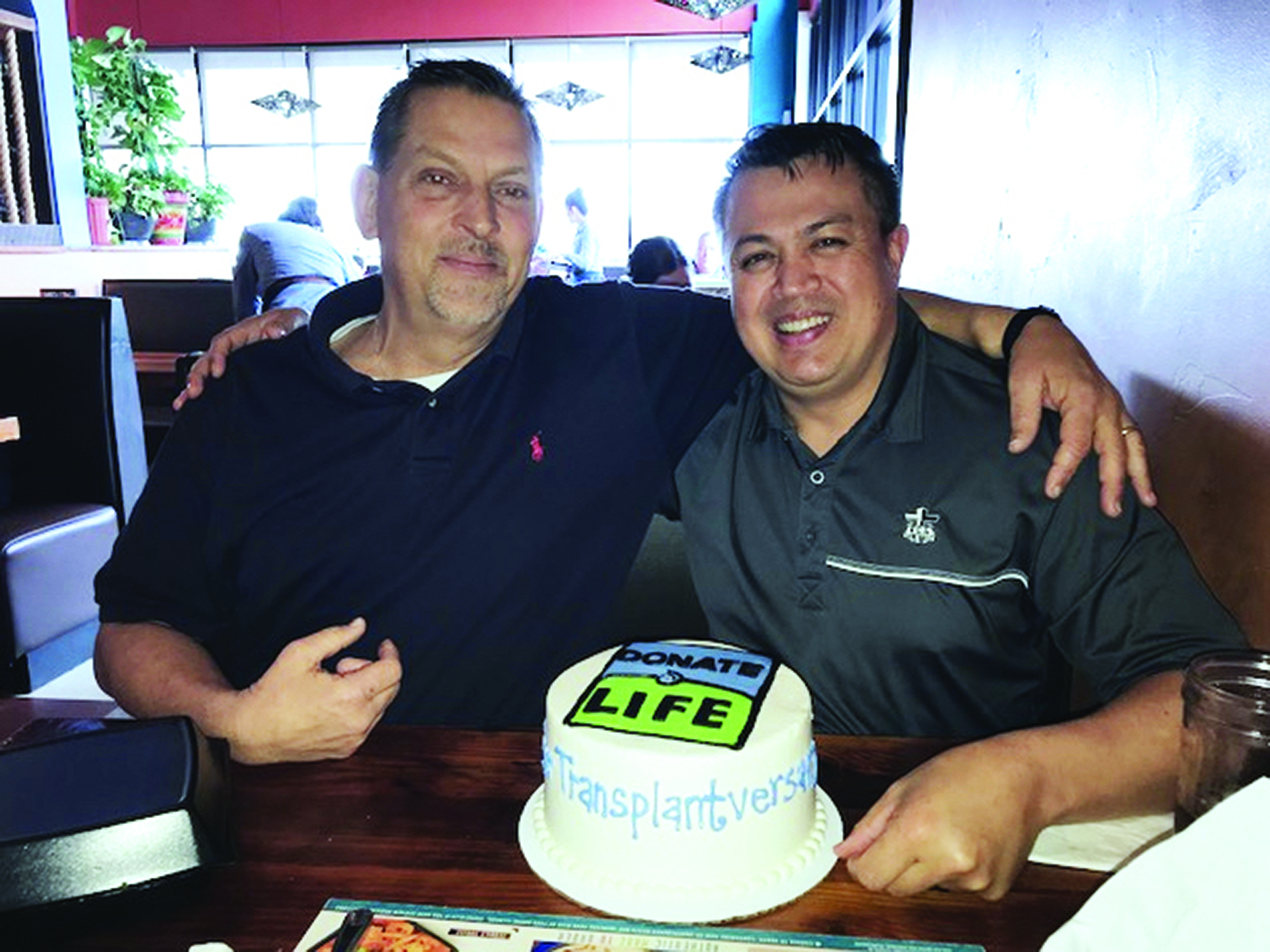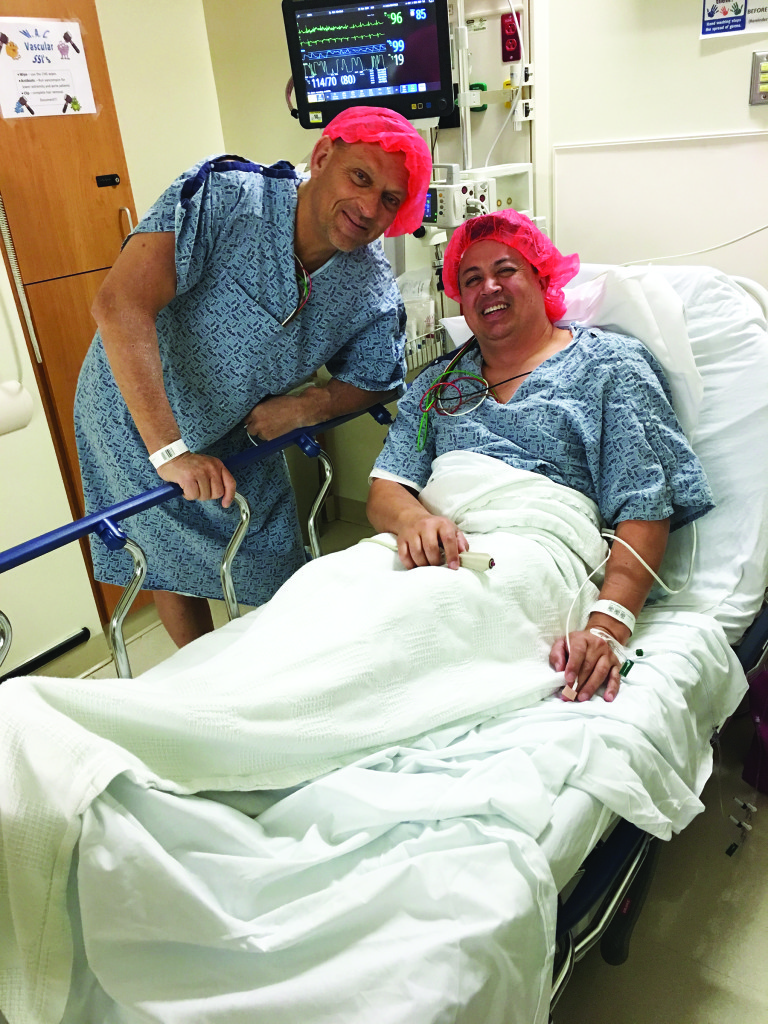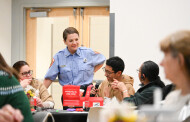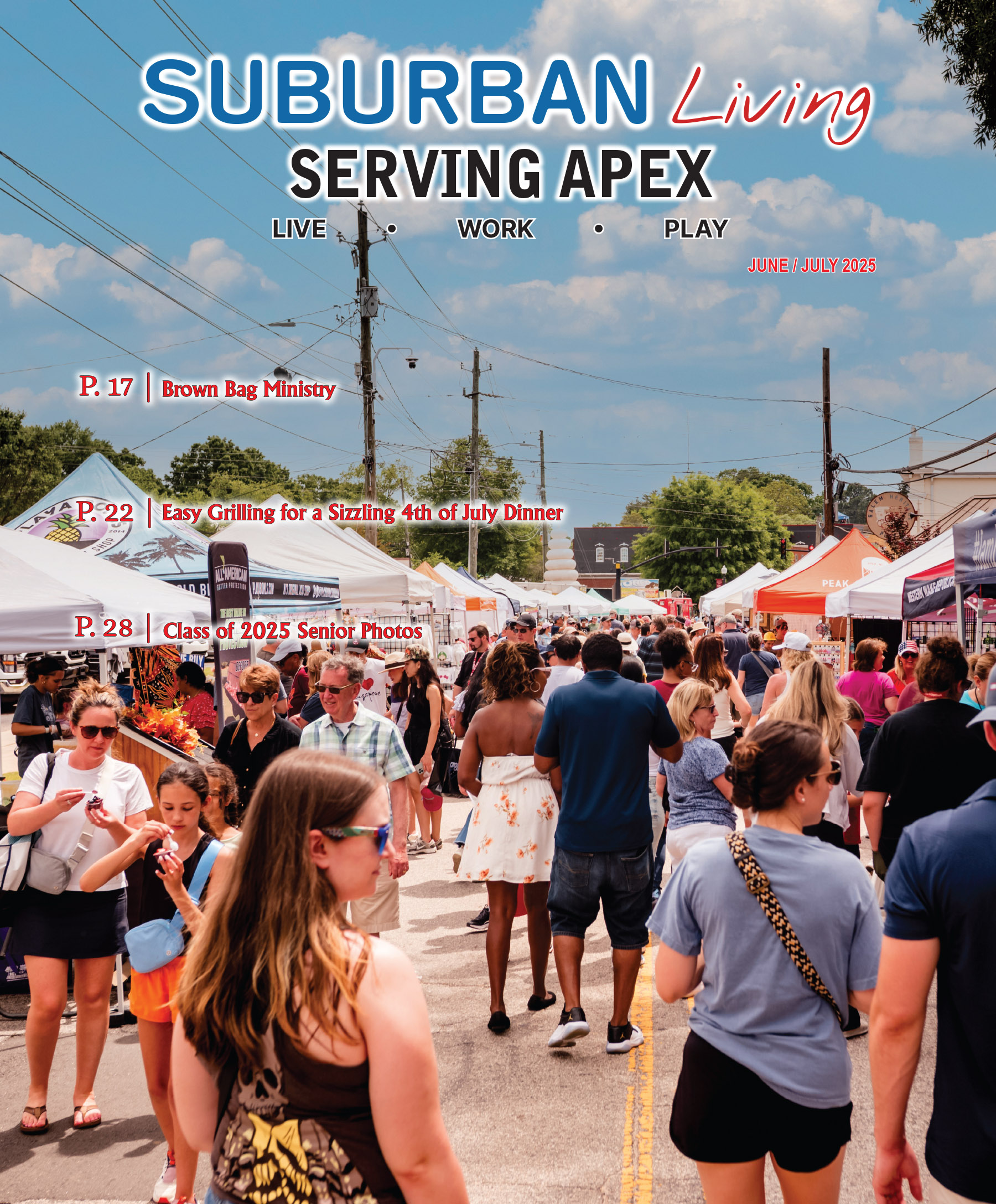April is a month of rejuvenation—flowers and trees in bloom, sunshine and warmer breezes, and light moods as summer peeks around the corner. It seems fitting that April is also National Donate Life month. To someone who has never given or received a vital organ, that designation may not have significant meaning. To the Ridout family of Apex, Stephen and Nicole and their daughter Claire and son Avery, Donate Life month represents a joyful story of an unparalleled gift.
The Progression of Kidney Disease
In the early 2000s, the Ridouts learned that Stephen had Stage 3 kidney disease. Doctors couldn’t say how long he might remain at that point, but the Ridouts knew that he would need dialysis once he reached Stage 5 (End-Stage) Renal Disease. For 10 years, Stephen managed his kidney disease with medication, diet, and regular monitoring by a nephrologist. But his condition gradually worsened.
In October 2011, Stephen and Nicole decided to be proactive and have a hemodialysis fistula prepared. In this procedure, a vascular surgeon connected a vein and artery in Stephen’s left forearm as a loop to his heart. The purpose of the fistula was to create a larger blood vessel through which to access blood during dialysis, a process in which a washing fluid called dialysate removes the toxins normally filtered by healthy kidneys.
Dialysis is a point of no return, and a new fistula had to “mature” for six months before use, so it made sense to do the procedure well in advance of Stephen needing dialysis for the first time.
The fistula surgery was successful but something wasn’t right. Stephen’s body was unable to get rid of the fluids he’d been given intravenously in preparation for the procedure. Nicole took Stephen to the emergency room where doctors told him, “You’re going to have to start dialysis. You have 50 to 60 pounds of fluid in your body. He had dialysis that night.”
Life on Dialysis
For a year, Stephen was a familiar face at the dialysis center. For the first six months, his blood was purified through dialysis via a heart catheter; after that, access was through his fistula. Eventually, the Ridouts got a hemodialysis machine and were trained so that Stephen could do his own dialysis at home.
Thus began a new way of life that included mail-order medical supplies; technical issues with the dialyzer machine; constant monitoring of diet, fluid intake, and strain on Stephen’s heart and other organs, and twice-weekly injections to increase his red blood count.
Four times a week, the machine removed the toxins and fluids from his body. “His fistula was his lifeline,” Nicole said. “He’d get blockages and they’d have to do angioplasty to clean it out.”
Stephen recalls, “Dialysis took five hours at night. It caused restless leg syndrome and cramping, or we’d have an alarm on the machine go off. I didn’t sleep. I didn’t eat. I was restricted to drinking 40 ounces of water a day. I was skin and bones; the color of my skin was bad. People said I looked like death.”
Running Out of Time
Starting dialysis automatically put Stephen on the list for a kidney transplant. He and Nicole were told that it could be anywhere from four to seven years before a viable kidney from a deceased donor was found because Stephen’s blood type—O Positive—had the longest wait. As the years ticked by, Stephen grew weaker.
Twice, he was treated for sepsis, a serious and sometimes deadly blood infection. And in February 2015, Stephen collapsed after climbing the stairs. The blood thinner he took for dialysis had resulted in internal bleeding after some polyps were removed during a colonoscopy. Emergency room doctors were astonished that he was still breathing. Nicole said, “A man Stephen’s size should have between 10 and 13 units of blood. He only had three or four units left in his body.” He was in the hospital for a week, received eight units of blood, and had another colonoscopy to ensure the bleeding had stopped. And, of course, he had to continue dialysis.
An Unimaginable Gift
In the fall of 2015, two old friends ran into each other at a high school football game in Sanford, North Carolina. One was Stephen’s brother. The other was William Boykin. They hadn’t seen each other in 30 years, but Stephen and his brother, Glen, and William and his brothers, James and Steve, had all been good friends growing up. William had heard that Stephen was on dialysis and needed a kidney transplant, but that evening he learned how dire Stephen’s condition was.
After the game, William was praying for Stephen while driving home to Wilson when he heard the words, “Why don’t you give him your kidney.” He told his wife, Christy, but was hesitant to believe that he was being called to donate a kidney.
William lives his faith with incredible certainty. “Faith is not just believing, but also trusting that God is going to do the right thing. You have to walk in that direction if you want to see miracles happen. With faith, there’s an action behind it, you can’t just keep praying for something to happen.”
Around Christmas, William was ready to act when he noticed a picture of Stephen and Claire on Facebook. “I thought about my own daughter and the fact that Stephen might not be able to someday walk his daughter down the aisle. I knew he was in a desperate situation.”
He found a cell phone number for Stephen through social media and called. The conversation between the two men was short and somewhat abrupt. Stephen admits, “I wasn’t very nice. William said he wanted to give me his kidney and I said, ‘Thanks, but it’s a lot of work and odds are you’re probably not going to match.’”
William says that when he told Stephen that he had the same blood type, “There was a hush on the phone.”
The Boykins contacted Duke University Hospital’s Kidney Transplant Program and William joined a group of nearly a dozen other people beginning the process to determine whether or not they were viable donors. “I did a phone interview and gave 9 to 12 tubes of blood. I had two days of testing for blood pressure, cholesterol, cancer, diabetes—you name it, they checked it. I was a 100% match. One test involved drinking a nuclear medicine to see how much my kidneys would flush out in a two-hour period. I knew God was in the midst of it when the surgeon said that a normal person filters about 76%, but I had filtered 110%.”
In April 2016, William was approved to donate a kidney. He and Christy and their son Brody and daughter Taylor met often with the Ridouts and the two families grew close. Through their respective transplant coordinators, a surgery date was set for September. At their pre-operative appointments in August, William was strong and healthy and keeping to a regular fitness routine, but Stephen’s tests revealed spots on his lungs and the shingles virus.
To the Ridouts’ frustration, the transplant surgery had to be postponed until the virus was gone and a pulmonologist had determined that the spots were benign nodules. Even then, the surgery was delayed further when Stephen developed liver issues and low iron and needed another colonoscopy. Then there were the holidays…
Finally, a new surgery
date. February 13, 2017…
Stephen was ready. And like William, he was filled with faith. “I wasn’t nervous,” he said. “I was counting down how many more days I had to do dialysis. I didn’t know how much longer I could take it. I started cleaning stuff up, getting rid of things, and I wasn’t ordering new supplies. I knew it was going to work.”
The day of the transplant came and the surgeries went as planned. William’s physical conditioning had paid off and he was visiting Stephen in the intensive care unit less than 12 hours later. Both good kidneys were sluggish at first and slow to function so a dialysis machine was on standby for Stephen, but overnight each kidney started working properly. The next week, Stephen was readmitted to the hospital to have fluid drained from around the surgical site, but after that, he says, “Then I started feeling good.”
Immeasurable Gratitude
Thanks to William, life has changed dramatically for the Ridout family.
A year later, Stephen takes a daily anti-rejection pill and receives a monthly anti-infection infusion. He never misses his medication, checks his blood pressure several times a week, and avoids undercooked meats and raw fish because of the chance of bacteria. Overall, he does his best to stay healthy and considers those sacrifices a small price to pay for what he has gained.
“The taste of food is back and I can eat again,” Stephen says. “I couldn’t wait to have a Coke and a cheeseburger. Phosphorus is in everything, like soda, and I had to limit phosphorus, salt, and potassium. I’m drinking water all the time now, and I have my energy back. I couldn’t drive much before, because I’d fall asleep, and we couldn’t go anywhere without taking 10 boxes of dialysis supplies with us. Being able to travel is one of the things I missed the most.”
Today, nothing compares to the deep gratitude that overwhelms the Ridouts when they talk about William and Christy and their family. “They’re special to us. ‘Thank you’ still doesn’t do it,” Stephen says. “I can’t explain to William how he changed things, how it was before, how bad it was. We talk several times a week and it’s like we’ve been friends forever and never missed a day.”
Stephen admits that while organ donation is a true “gift of life,” it might not be for everyone. “Faith has a lot to do with it,” he says, “believing it’s the right thing to do, it’s what God wants you to do, and that God’s going to make sure everything ends the way it’s supposed to end.
If you think you can help, help. Don’t be afraid. Don’t assume someone else will do it. You don’t know how much it changes people’s lives.”
For William, donating his kidney is an expression of his trust in God. “I think of Proverbs 3: 5-6…Trust in the Lord with all your heart, soul, and mind and in all your ways acknowledge Him and He will make your path straight. I try to be an example to my kids, not just tell them what God wants them to do.”
In a final sign of divine affirmation, William recalls his first follow-up after the surgery. He asked the nurse how many of the other people in his donor group had been approved. She said, “You’re the only one.”
According to Donate Life America’s website, more than 116,000 men, women, and children await organ transplants. Someone new is added to the national organ transplant waiting list every 10 minutes. Eighty percent of those on the list are waiting for a kidney. More than 55% of American adults are registered organ, eye, and tissue donors.
This spring, learn more about organ donation by visiting the following websites for more information about kidney disease, the donation registry, and becoming a living donor: www.kidney.org, registerme.org, www.DonateLifeNC.org/Register..









